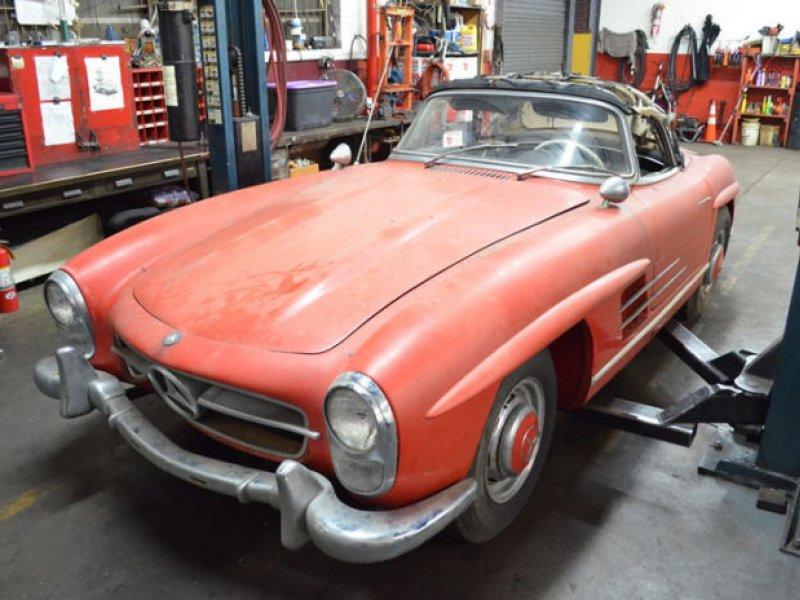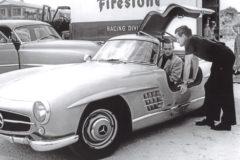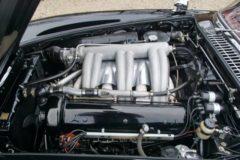The legendary Mercedes-Benz Gullwing is one of the rare cars designed for competition use, before the manufacturer decided it would also be the perfect sports car for the most demanding car enthusiasts.
In his presentation during the 1952 competition season, the Gullwing was a sensation at every competition in which he competed. The 300 SL not only took the first two places in the Le Mans that year, it also took the first four places at the Nürburgring, first and second place during the Carrera Panamerica, and second and fourth place in the Mille Miglia.
The 'Gullwing', the 'seagull wing': because the importer wanted it
Just like the Ferrari Daytona and the Porsche Speedster, the birth of the Gullwing on the public road was the result of the pressure that the American importer, the former German immigrant Max Hoffman, exerted on the Mercedes-Benz board. Hoffman guaranteed the German car giant a purchase of 500 units for the American market. That led Mercedes-Benz to set up a production line especially for the 300 SL.
So it was that the 300 SL was unveiled in February 1954 in New York and then got a parallel model in the form of the 300 SL Roadster, a convertible. American buyers welcomed the Benz specified for a top of 255 km / h and in the 1950s bought 80% of the Gullwings and Roadsters produced.
The 300 SL was pioneering in many ways in terms of styling and technology
First, he had a three-dimensional tubular frame because the head of the "detective and research department," Rudolf Uhlenhaut, insisted on using such a welded framework instead of the traditional approach with a platform chassis and a carrying body. That decision made it difficult to just use folding doors. In order to solve that problem, the ingenious, hinged doors were devised.
Despite the fact that the 300 SL competition was made of aluminum, the 'normal' Gullwing was made of steel. Incidentally, 25 aluminum specimens were produced for the extremely richly upholstered happy few.
Another revolutionary benefit of the 300 SL was the introduction of the mechanical fuel injection
With that, Mercedes had a world first in automotive serial production. The fuel injection helped the 3.0 liter deliver six-cylinder 215 hp and a torque of more than 275 Nm. An 1954'er Gullwing was 255 km / h fast.
The design of the 300 SL was a sleek, elegant automobile
With its ventilation grilles placed in the flanks and the 'eyebrows' above the wheel arches, the Auto had a 'post-Art Deco appearance' that, together with its radical door construction, set the SL down as a piece of pure expression of Germanic college of automotive technology.
Stopped after an accident
Although the 300 SL was a direct descendant of the SLR competition version, Mercedes-Benz stopped all competition activities in 1955 after a terrible accident during the Le Mans. While the legendary Miguel Fangio was in the lead there in his SLR, Pierre Levegh was at the wheel of the second Mercedes. During the race, Lance Macklin's Austin-Healey had to be fully anchored and set aside after being passed by Mike Hawthorne in his Jaguar. That put Macklin in a collision course with Levegh's SLR that just accelerated. The Mercedes of the Frenchman hit the back of Austin-Healey. SLR then hit the wall, killing his rider immediately, while all sorts of wreckage influences the public. Because of that flying rubble, more than eighty people were killed in the audience. It was the worst accident of all time in motor racing and the reason that Mercedes-Benz kept aloof from motorsport for almost forty years.
But the Gullwing put Mercedes back on the map as a sports car manufacturer
And became a textbook example of the leading German automobile craftsmanship for customers for whom no price was too high. The SL concept would later have worthy successors in the form of the 450 SL from the 70 years and more recently with the retro 600 SL and the 320 km / h fast SLR McLaren models, whose grilles are a tribute to the inspired nose of the original 300 SL.







I thought I remembered that the 300SL Cabriolet was not built parallel to the Gullwing, but was its successor. The construction of the Gullwing was expensive - Mercedes would never have saved a cent from the construction - so the successor got a 'normal' chassis, so that normal doors could also fit in.